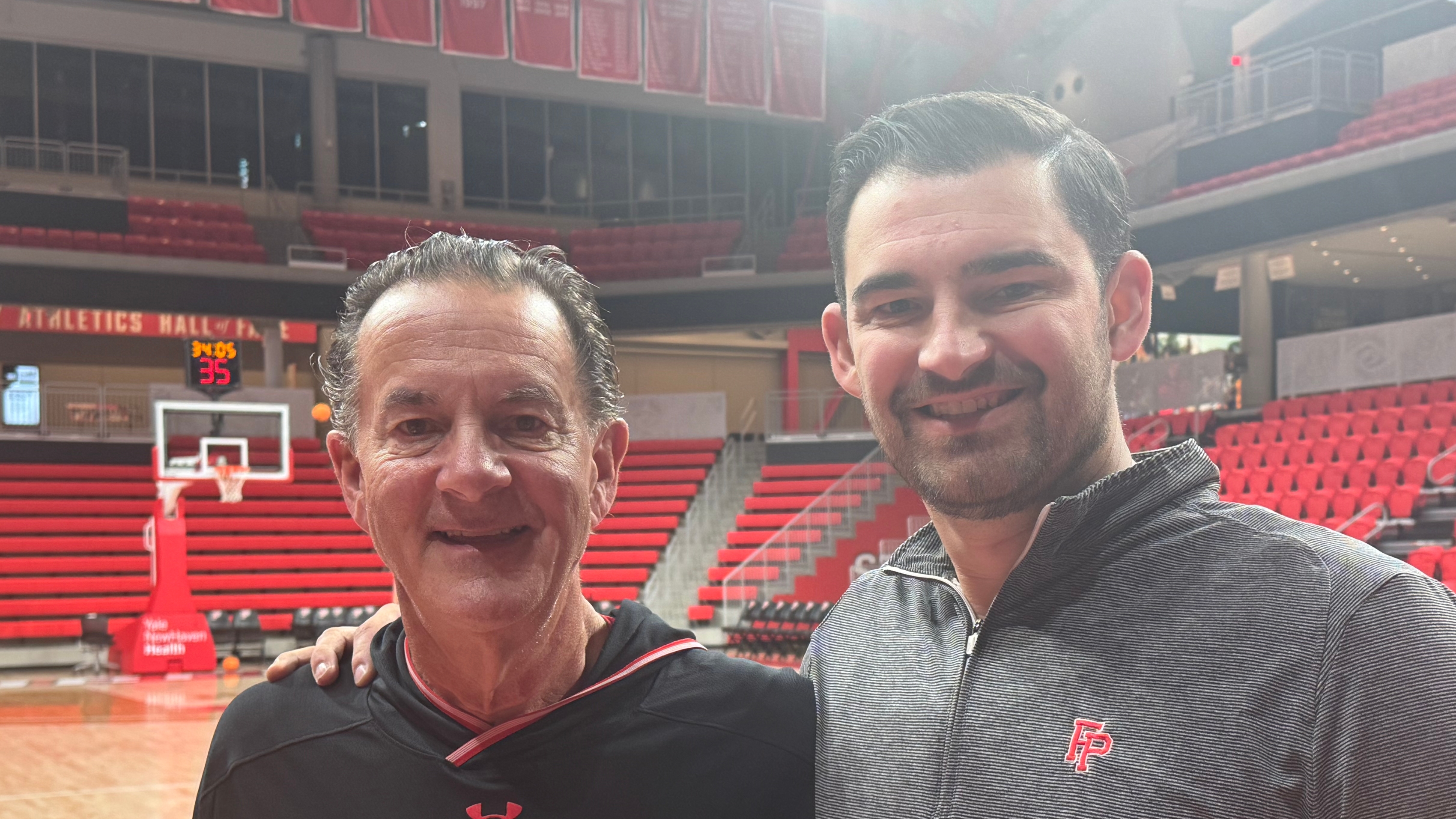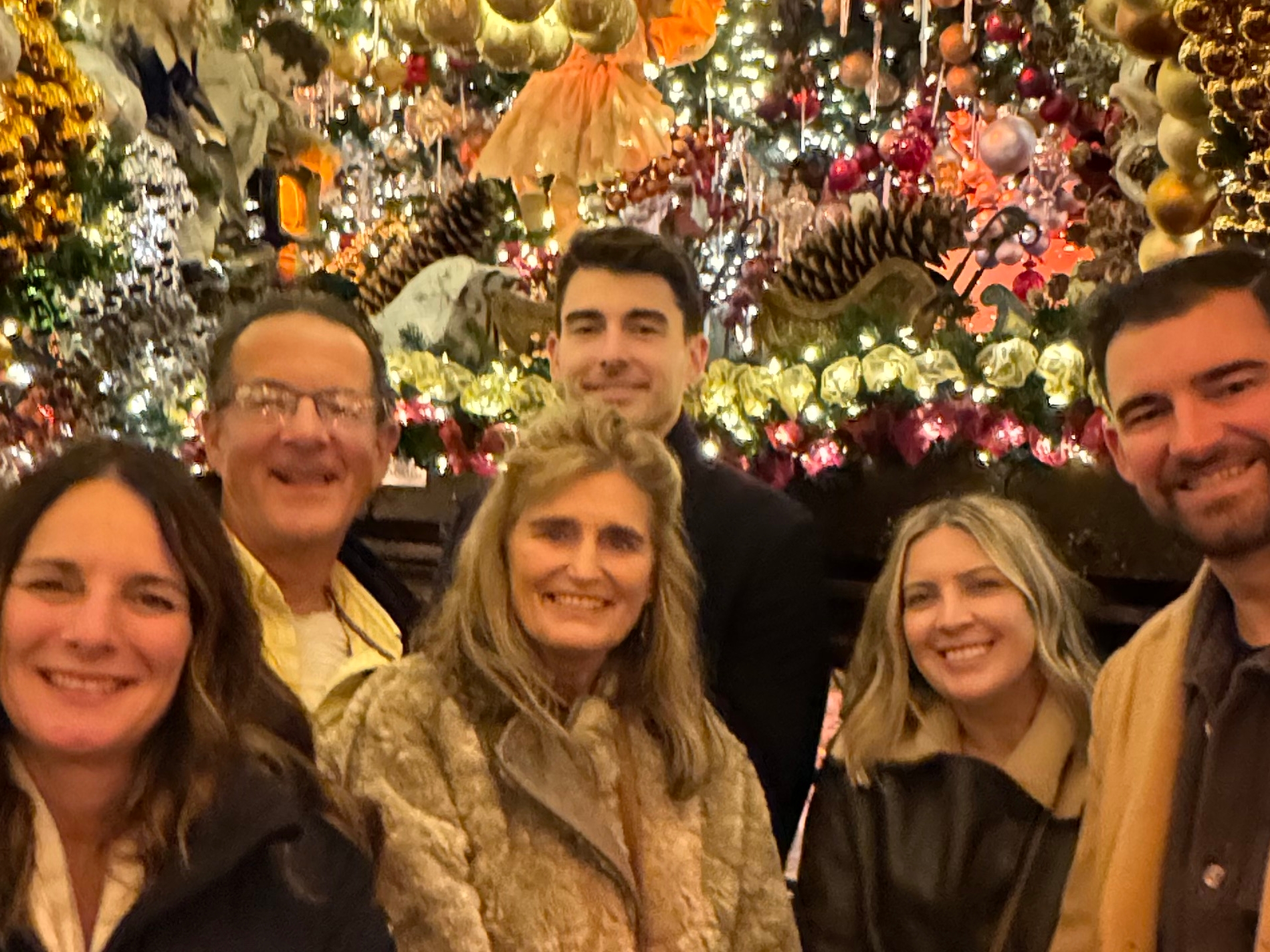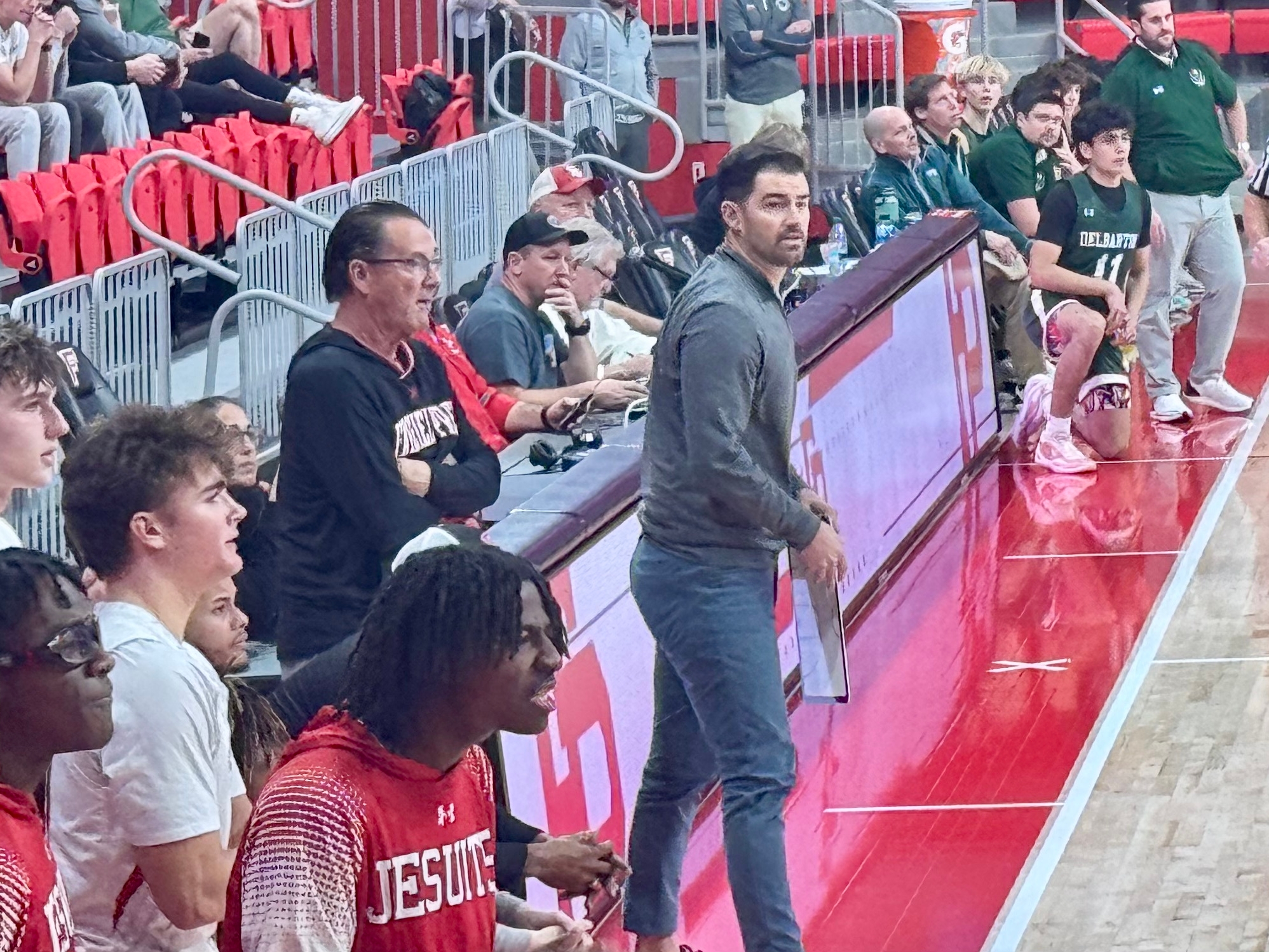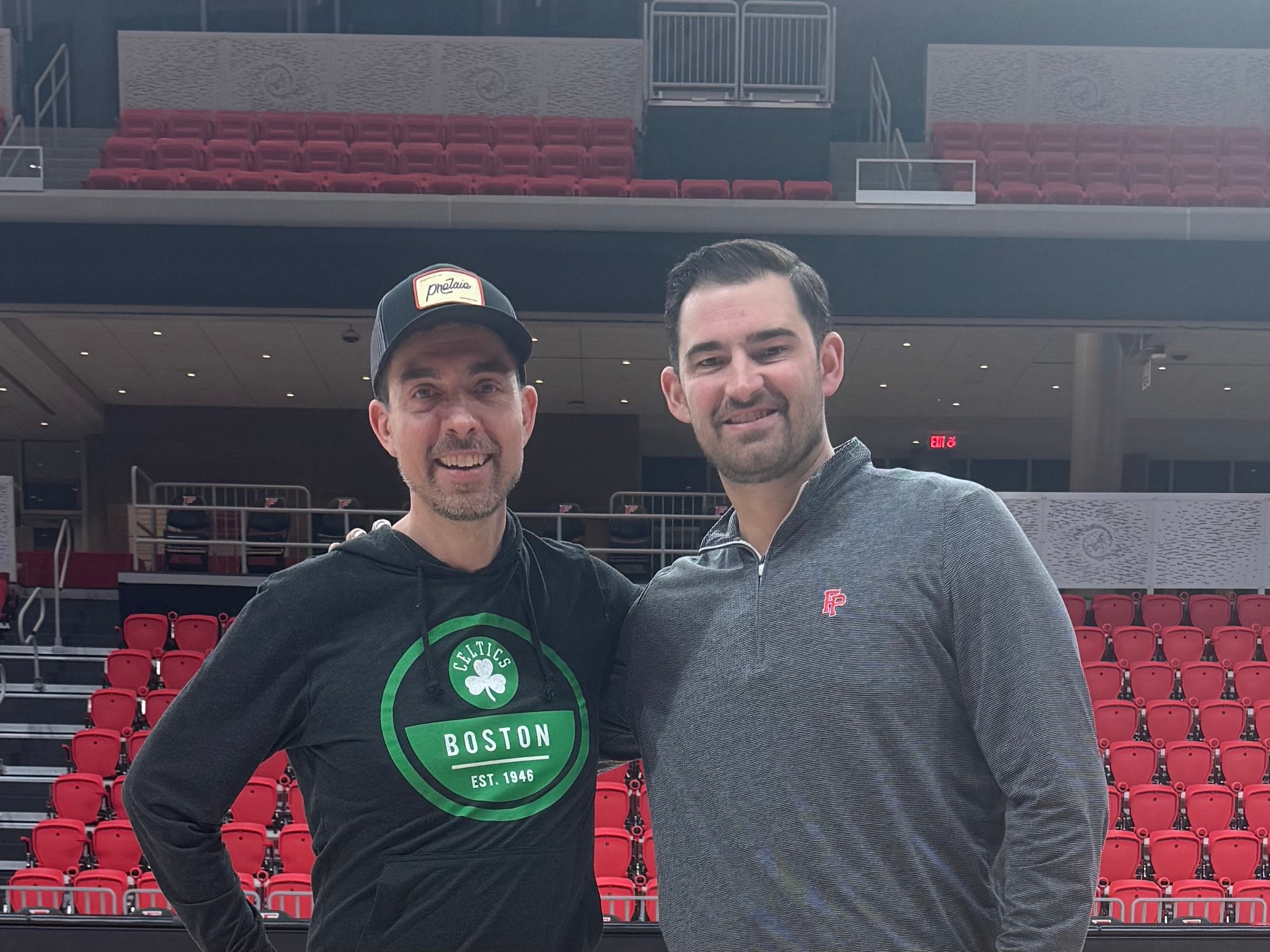
Hypertrophic Cardiomyopathy (HCM) and the Holidays
Mike Papale is the author of “A Big Heart: A Memoir”, chronicling his own experiences with hypertrophic cardiomyopathy (HCM), which began with a cardiac arrest out of nowhere at age 17. Mike runs a patient advocacy foundation, In A Heartbeat, to promote disease awareness and support the widespread availability of automated external defibrillators (AEDs). He also works as Manager of Community Relations at Defibtech, an AED manufacturer.
Martin Naley is the VP of Marketing at Prolaio, a company that helps people with heart conditions track their own biometric trends for use in their care.
Mike and Martin met each other at the International HCM Summit in Boston this fall. With the holidays coming, they decided to share some thoughts.
Cover photo: Mike and his father, Mike Sr., seen together after a game. Together, they coach a high school basketball team in Fairfield, Connecticut
Martin
Mike, what’s it like being a cardiac arrest survivor around the holidays?
Mike
Christmas in 2005 was nearly my last, but my family and I had no idea of the danger on the horizon. In August 2006, at the age of 17, my heart suddenly stopped, while I was standing courtside during a community basketball camp. When I awoke, 36 hours later in a hospital ICU, I learned that I had been saved by first responders. It turned out that my heart muscle was abnormally thick, which can lead to sudden changes in heart rhythm and even death. My condition, called hypertrophic cardiomyopathy (HCM), runs in families. Sometimes it’s asymptomatic and people don’t even know they have it until it’s too late.

My family and I have never taken the holidays for granted again. We can’t help but imagine that my chair at the table could have been empty for the last 18 years. Instead, this Christmas marks the first year where I’ve known about my HCM for more years than not. My time with friends and family, and my time to make a difference in the world, has more than doubled since that fateful day.
Mike: "We can’t help but imagine that my chair at the table could have been empty for the last 18 years."
Martin
As the holidays approach this year, there’s been some good news from Congress. Can you tell me about the HEARTS Act?
Mike
I’m so excited to tell people about the HEARTS Act! The acronym stands for Cardiomyopathy Health Education, Awareness, and Research, and AED Training in Schools. It was passed by the US Senate on December 10th, unanimously. Finally, something we can all get behind. The bill had passed in the House earlier this fall, so now it’s on President Biden’s desk and will likely be signed into law this week.
The bill, linked here, has four main provisions and requires action across multiple agencies.
First, it focuses on education and awareness, requiring the Centers for Disease Control to develop and distribute public education materials and resources about high-risk cardiac conditions and genetic heart rhythm abnormalities that can cause sudden cardiac arrest in children, adolescents, and young adults. This includes guidelines for placement of automated external defibrillators (AEDs) in schools, as well as training information on AEDs and CPR and recommendations for cardiac emergency response plans. The act also requires the CDC to issue a report on the prevalence and epidemiology of cardiomyopathy across the human lifespan. And last, the CDC is required to take actions to standardize screenings and assessments, such as disseminating straightforward worksheets and developing guidelines. All these actions are geared toward making sure there is greater public awareness of cardiomyopathy conditions as well as a higher likelihood that individuals with a condition will be diagnosed and managed proactively.
Next, the bill requires the National Institutes of Health to develop a report, to be submitted to Congress, outlining ongoing research efforts regarding cardiomyopathy in adults and children, identifying a research agenda and areas of greatest need. The bill stops short of mandating additional research funding, but it does ensure that cardiomyopathies are carefully considered in the coming research funding cycle.
Finally, the Act encourages the Department of Health and Human Services to award grants to make AEDs and CPR training widely available in public elementary schools and secondary schools. These grants could support the development of materials to establish AED and CPR programs, fund training for students and staff, and provide support for the development of cardiac emergency response plans. But most of all, grants could be used to purchase and maintain modern and functional AEDs wherever they are needed.

The American Heart Association led the effort to get the bill introduced and passed, but it took grassroots activism to make it happen. I was proud to be a part of it, including making trips to DC to speak with my own representatives in Congress. Awareness, education, and readiness for high-risk heart conditions, including cardiomyopathies, have been my personal passion as a patient advocate, and the HEARTS Act is an important milestone for everyone living with or caring for cardiac conditions. Bringing about change took community, time, and commitment.
Mike: "It took grassroots activism to make it happen."
Martin, you’ve been working to help patients for a long time. What’s on your mind now?
Martin
In health care, there is power in numbers. In a way, that’s about community, and activism, like you showed in getting the HEARTS Act passed. I know how great that feels - I was involved similarly as the 21st Century Cures Act moved through Congress in 2016. That gave patients more access to their health data, which to me was really important, making it possible for people to use their data in their care and contribute it to collective learning.
As analytics systems become faster and more powerful, their thirst for data is insatiable. Clinical trials are too limited and expensive. The only path forward is large-scale patient engagement and data collection with patient consent. The more who participate, the deeper the insights.
Mike
How would that work in cardiac conditions?
Martin
In cardiomyopathies, disease management is often reactive. Something bad happens, or symptoms worsen, and then patients and their care teams problem-solve and adjust treatments. I’d like to believe It could be better if we could actively observe the patient for signs of symptoms, even the ones they can’t feel, and take action earlier.
Maybe care transitions, like stepping up to the next level of precautions or treatments, would be smoother. Maybe severe events like sudden cardiac death could be predicted and stopped before they happen. Care could be less expensive and patients’ lives could improve.
Mike
You’ve mentioned that you’re working to make that happen. Can you describe what you’re doing at Prolaio?
Martin
I’m fortunate to work with people who share this exact vision, and who are willing to take the long view on amassing data, through patient participation, to improve the entire care continuum for diseases like HCM. Our HCM program is geared to enroll every person in the country with an HCM diagnosis. It’s a monitoring service, authorized and overseen by Prolaio’s medical staff. Patients get a kit with supplies like a smart wristband and disposable ECG patches that they wear from time to time, and they follow a monitoring regimen through a mobile app that tells them when tasks are due. The patients can see their values and trends, which they can consider in their disease management and share with others involved in their care.
Everything involved, from biometric sensors and algorithms to Prolaio’s data system itself, is medical grade. That’s a deliberate, and not inexpensive, choice we made to ensure that whatever we see or learn is reliable. As patient participation increases, the company’s AI-powered analytics will scan the data to find any patterns that could indicate disease transitions or risks. As those new insights and algorithms are validated, they’ll be submitted to the FDA for clearance and then included in the data return to patients and their providers. The more who join, the more we’ll learn, and the more the community will benefit.
Martin: "In health care, there is power in numbers... Our HCM program is geared to enroll every person in the country with an HCM diagnosis."
I came from a background in cancer care, and I’ve seen this principle is true and realizable. Large troves of data, contributed by patients, enabled insights into which genes are the drivers of disease and which treatments worked in which subgroups. I’ve seen this promise come true throughout my career in cancer, and it’s been remarkable watching the advancements in that space, where many types of cancer have become manageable chronic conditions. I’m excited to see those principles applied now in cardiology.
Mike
What does the system cost for patients?
Martin
Oh, I’m glad you asked. There is no charge to patients. We’re just grateful for their participation. Once we have enough evidence about the medical and economic benefits of this kind of monitoring, we are planning to charge insurance companies. We’ll work to keep patient out-of-pocket costs to a minimum always.
You’ve signed up for Prolaio HCM Companion monitoring - how’s it going?
Mike
Yeah, I signed up, and I got my kit and wore the devices. It wasn’t hard to do. I wore the ECG patch for a week, and then I switched over to just the bracelet like the app said. I have to say, so far it’s been just plain boring, to be honest. My condition has been pretty stable for a long time, so there’s not a lot of change happening in my first month’s data. I guess that’s to be expected?
Martin
In HCM, I guess boring is good news, right? We don’t want anything to happen to you! But it’s also the exact reason we need so many people involved. Most patients have long periods with no change in their symptoms, so we need to watch lots of people over a long horizon to see the patterns. I deeply believe that it will work.
What else is on your mind, as the holidays are coming?
Mike
We had another tragedy here in Connecticut just before Thanksgiving. Jahkye Gayle, a 14-year-old boy, died of sudden cardiac arrest during football practice. These tragedies keep coming. I’m excited by the HEARTS Act, but that just sets up the next round of work for me and the foundation. We need to make sure all the benefits of the HEARTS Act are realized at the community level so stories like Jahkye’s can be different. No more empty seats at the holiday table.
It’s been a long time since the first Christmas after my cardiac arrest. While the state of shock has waned, my urgency only grows, knowing that there is more work to be done.

On one hand, that means diagnosing more people sooner and making sure life-saving measures like AEDs are available as a safety measure. And then for everyone who’s diagnosed, it means having better ways to see when something is going wrong, and having peace of mind when things are steady.
To me, the greatest gift is a normal life. I think that’s what brings us together, you and me. We’re both working to help HCM patients have a normal, predictable life. That’s not boring at all.
Mike: "The greatest gift is a normal life."
Martin
If you have some time over the holidays, check out Mike’s book. It’s called “A Big Heart: A Memoir”, and you can buy it at your favorite e-book store or in paperback on his foundation’s website, where proceeds go to advocacy work and AED donations.
Prolaio HCM Companion monitoring is available to all HCM patients. Learn more or sign up at this link.